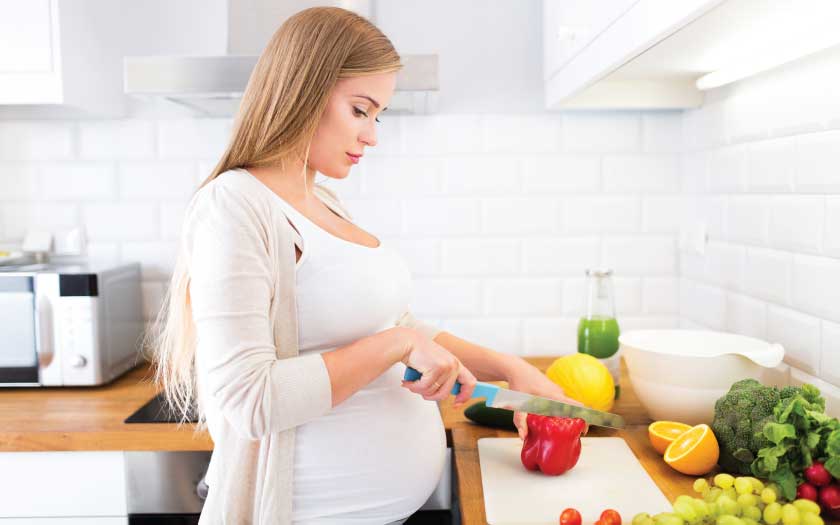Even if you think you’re already eating well for your pregnancy, there is always room for improvement!
Pregnancy automatically comes with an increased need for protein, certain vitamins and minerals (such as folic acid and iron), and more calories (for energy). Eating highly nutritious meals is one of the best things you can do for your baby and of course, your pregnant body. However, it does not mean that you have to eat a whole lot more.
Firstly, know your body mass index and determine if you’re of normal weight or otherwise. If you start at a healthy weight, you don’t need additional calories during the first trimester. In the second trimester, you should need about 340 extra calories a day and about 450 extra calories a day in the third trimester. If you’re underweight or overweight to start with, you’ll need more or less than this, depending on the weight plan your doctor has for you.
Eat simply good food
To meet your daily needs for protein, calories, carbohydrates, healthy fats, and key vitamins and minerals during pregnancy, eat a variety of foods and be sure to choose foods that are as close to their natural state as possible. When it comes to fruits and vegetables, look for different colors, types, and textures. Pick whole-grain bread or brown rice over refined white bread or white rice, and fresh fruits or frozen unsweetened fruit over canned fruits sitting in a heavy syrup, for instance.

Keep away from food that can harm your pregnancy
Some foods can be dangerous when you’re pregnant, especially if they’re known to be sources of bacteria that can be harmful to an unborn child. Watch out for the following foods and ensure that your diet does not include anything from this list:
- Raw seafood (such as oysters or uncooked sushi)
- Unpasteurized milk (and cheese made from unpasteurized milk)
- Soft cheese (such as Brie or Camembert)
- Mexican cheese (like queso blanco and panela)
- Pâté
- Raw or undercooked meat and poultry
Take a prenatal vitamin
Even without morning sickness or food aversions, it’s difficult to meet your nutritional needs through your diet. A prenatal vitamin-mineral supplement helps you get the nutrients you and your baby need to thrive.
Folic acid and choline
You’ll need 400 mcg of folic acid daily before you become pregnant and also during early pregnancy. Some doctors suggest boosting your intake to at least 600 mcg once you’re pregnant. A deficiency in folic acid has been linked to neural tube birth defects (NTDs), such as spina bifida.
Choline is another important nutrient that researchers now believe may help prevent NTDs. You need 450 mg of choline a day during pregnancy. Most prenatal vitamins don’t contain it, so you’ll have to get it from food or ask your doctor about taking a choline supplement.
Talk to your doctor about other helpful supplements
Later in your pregnancy, your doctor may suggest that you take iron or calcium supplements to make sure you’re getting enough of these key minerals. Some experts also recommend taking a vitamin D supplement throughout pregnancy.
Also, talk to your doctor or a registered dietitian about your nutritional needs if:
- You’re a strict vegetarian
- You have a medical condition such as diabetes, gestational diabetes, or anemia
- You have previously delivered a low-birth-weight baby
If you have trouble swallowing your vitamins or keeping them down, search for a chewable supplement or one in a powdered form that you can mix with water. And keep in mind that more isn’t always better: Don’t take megadoses of any vitamin, mineral, or herbal supplement without medical supervision — they could harm your developing baby.
Eat smaller portions, more frequently
Remember, you don’t have to stick to the ‘normalcy’ of three square meals a day to be healthy throughout your pregnancy. If nausea, food aversions, heartburn, or indigestion make eating full-size meals uncomfortable, try eating small, frequent meals throughout the day instead. If you’re most hungry when it’s not typically time to eat, go ahead and have your meal when the feeling strikes. Eating in a pattern that works for you will help you meet your nutritional needs during pregnancy.
The goal is to ensure your body gets adequate nutrition. In any case, you’ll soon find out that as your pregnancy progresses and your baby increasingly crowds your stomach and other digestive organs, you won’t be up for big meals anyway.
Featured image source: Shutterstock


